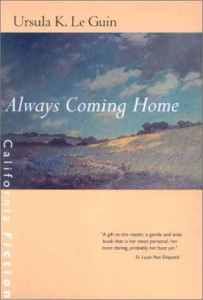These are my first impressions after reading Always Coming Home (Ursula K. Le Guin; 1985) in October 2008. I will be discussing Always Coming Home in future essays. Spoilers.
 At first, I didn’t think I would like this unusually structured book, but it very gradually and completely captured my imagination. It is a collection of writings–poems, songs, stories, and essays–about the life and culture of a group of people living in California far in the future, long after our own civilization has collapsed and been almost obliterated. It is not clear who has collected these writings, but it seems to be a character named Pandora, an emissary from our present time who is perhaps merely dreaming this utopian future society.
At first, I didn’t think I would like this unusually structured book, but it very gradually and completely captured my imagination. It is a collection of writings–poems, songs, stories, and essays–about the life and culture of a group of people living in California far in the future, long after our own civilization has collapsed and been almost obliterated. It is not clear who has collected these writings, but it seems to be a character named Pandora, an emissary from our present time who is perhaps merely dreaming this utopian future society.
The Kesh, as these people are called, are in many ways very primitive, with a Native American-style culture that revolves around seasonal celebrations, growing crops, caring for livestock, hunting and gathering, and taking care of all the work of life. The Kesh’s society is the opposite of capitalism, in that wealth comes through giving things away, not owning them, and everyone shares in the village’s resources.
But the Kesh are not entirely primitive. Though all fossil fuels are gone, they have electricity (sun-, wind-, and water-powered, no doubt), as well as access to a network of computers–a network that extends around the globe and into outer space via unmanned probes and satellites–that store all of human history and knowledge. The Kesh just don’t seem interested in progressing past their idyllic state, and they refer to societies like ours as “people with their heads on backwards.”
Not that life is perfect for the Kesh. They suffer from a high rate of birth defects and early mortality due to radiation and chemical poisoning, leftovers from our defunct civilization, which keeps the population from growing too large. And their stories reveal that they suffer from human nature just like any of us.
One such story–the longest in the collection, almost a novel–presents a dystopian alternative to the Kesh. A warlike society called the Condor people come to the Valley where the Kesh live, and one of the soldiers marries a Kesh woman and fathers a daughter, Stone Telling. When she gets older, she chooses to accompany her father to his home. Her story is the only knowledge the Kesh have of how the Condor people live. They hold slaves, are ruled by a dictator, and worship a single powerful god. The women have no rights and are not allowed to leave their homes without completely covering themselves. They are obsessed with war and building war machines that they don’t have the fuel to power, at the expense of feeding their people. Eventually, Stone Telling escapes back to her own people, but we get the sense that the Condor people are well on the path to self-destruction.
It took me a while to get caught up in the stories of the Kesh. Stone Telling’s long memoir, broken into three parts and interspersed by other writings, helps anchor the book. I gradually found myself enchanted and fascinated by the Kesh as I learned more about them, especially their spiritual practices and the important ritual dances they hold at significant times of the year. Mostly, I admired their approach to life, without judgment or a strict moral code, respectful of both the individual and the whole, which includes the animals, plants, stones, earth, stars, everything.
I have lately felt overwhelmed by depressing world events, our materialistic culture and the problems we felt, particularly our environmental problems. This book offered both an escape and an alternative way of thinking about those problems.
Always Coming Home won the Janet Heidinger Kafka Prize. It was nominated for National Book Award for Fiction, Locus Award for Best Science Fiction Novel, and Mythopoeic Fantasy Award.